Ethics and Politics in Research Write-Up: Scientific Integrity
VerifiedAdded on 2020/11/23
|7
|1798
|51
Report
AI Summary
This report delves into the critical realm of ethics and politics within research, specifically addressing the pervasive issue of plagiarism. It begins by defining plagiarism, outlining its various forms, and emphasizing its severe impact on the quality and effectiveness of research. The report explores the detrimental consequences of plagiarism on students' academic reputations, professional images, and potential monetary repercussions. Furthermore, it highlights the importance of maintaining the privacy and confidentiality of research informants. The report offers practical suggestions and recommendations for avoiding plagiarism, including paraphrasing, proper citation techniques, and the correct use of quotations and referencing. The conclusion underscores the significance of ethical conduct in research, emphasizing the need for researchers, students, and other stakeholders to uphold integrity and avoid plagiarism to ensure the credibility and advancement of knowledge.
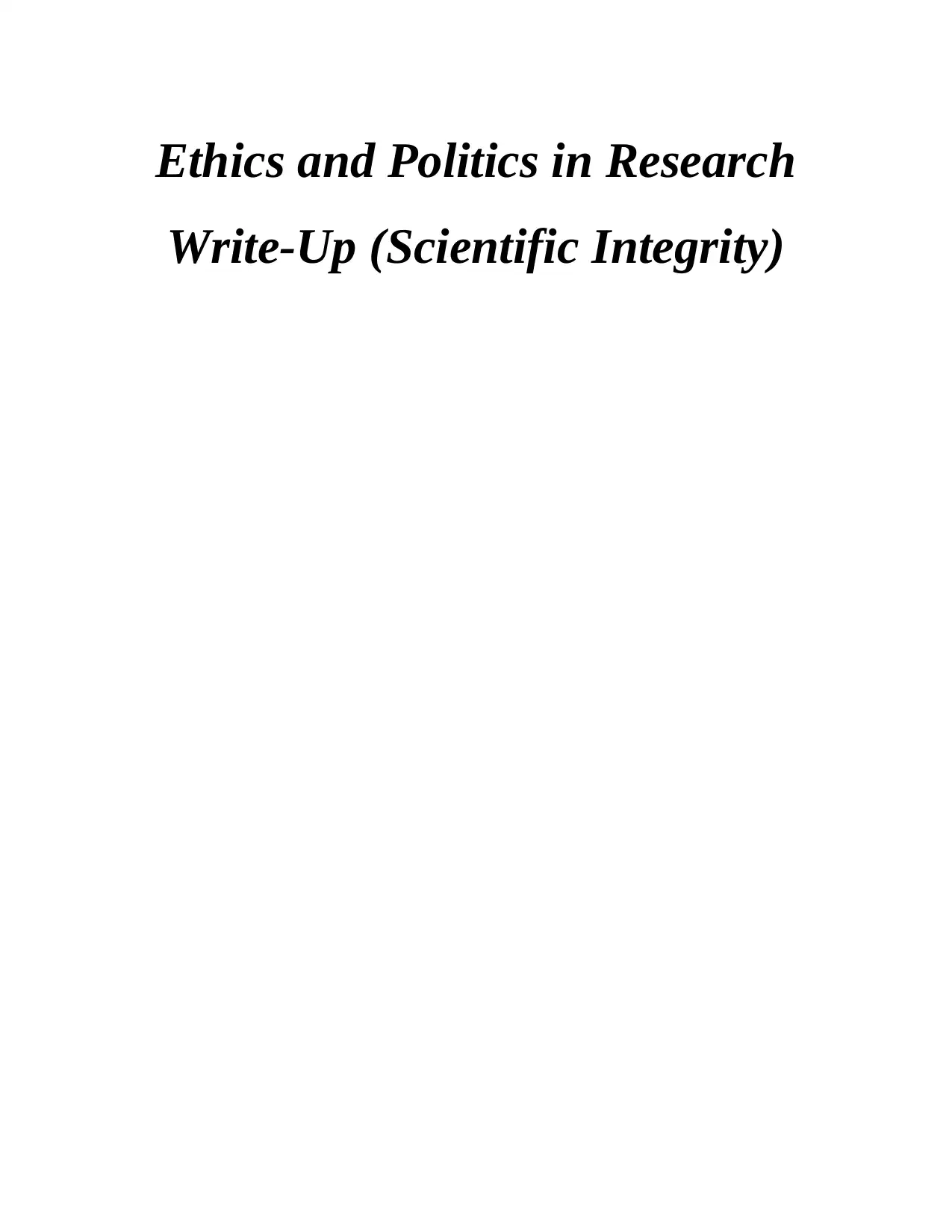
Ethics and Politics in Research
Write-Up (Scientific Integrity)
Write-Up (Scientific Integrity)
Paraphrase This Document
Need a fresh take? Get an instant paraphrase of this document with our AI Paraphraser
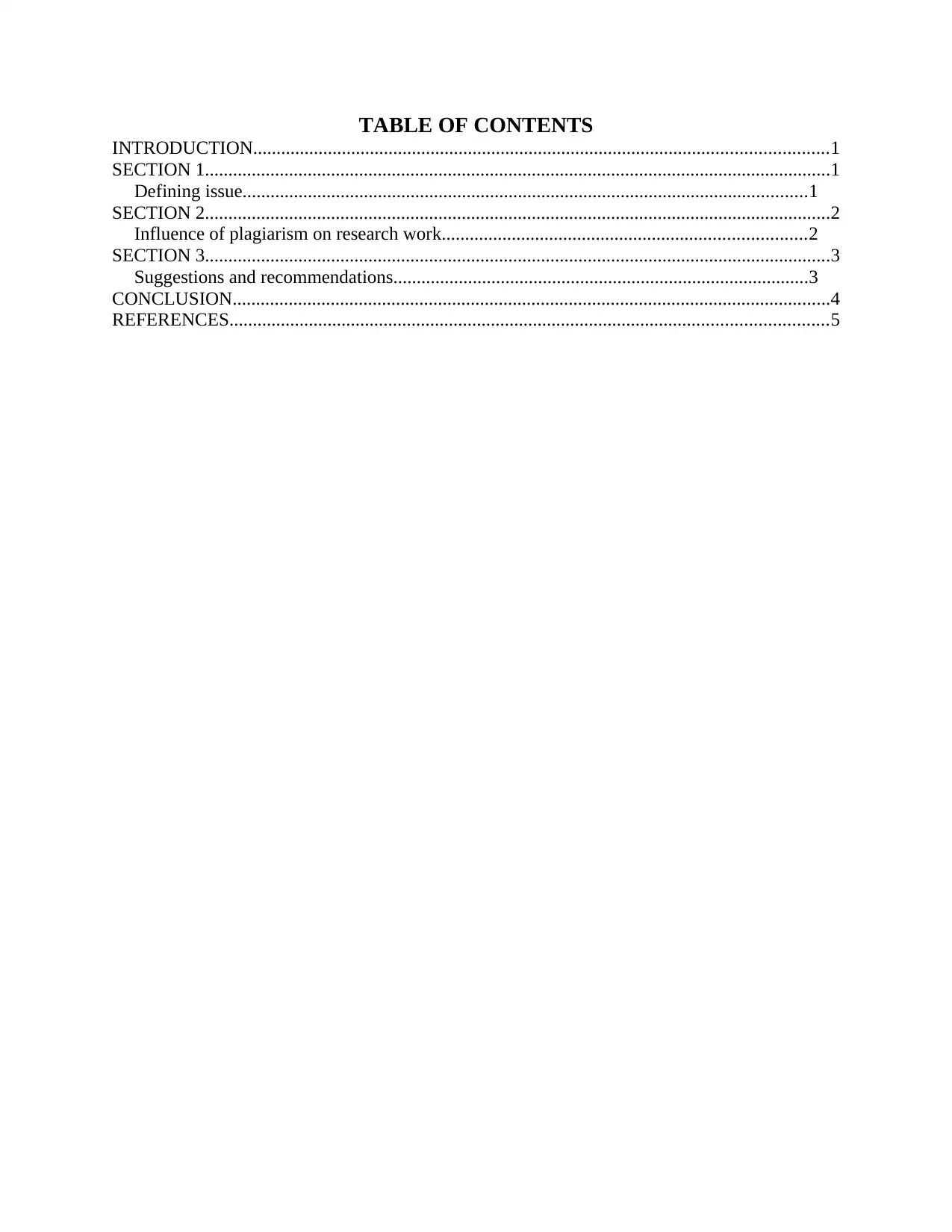
TABLE OF CONTENTS
INTRODUCTION...........................................................................................................................1
SECTION 1......................................................................................................................................1
Defining issue.........................................................................................................................1
SECTION 2......................................................................................................................................2
Influence of plagiarism on research work..............................................................................2
SECTION 3......................................................................................................................................3
Suggestions and recommendations.........................................................................................3
CONCLUSION................................................................................................................................4
REFERENCES................................................................................................................................5
INTRODUCTION...........................................................................................................................1
SECTION 1......................................................................................................................................1
Defining issue.........................................................................................................................1
SECTION 2......................................................................................................................................2
Influence of plagiarism on research work..............................................................................2
SECTION 3......................................................................................................................................3
Suggestions and recommendations.........................................................................................3
CONCLUSION................................................................................................................................4
REFERENCES................................................................................................................................5
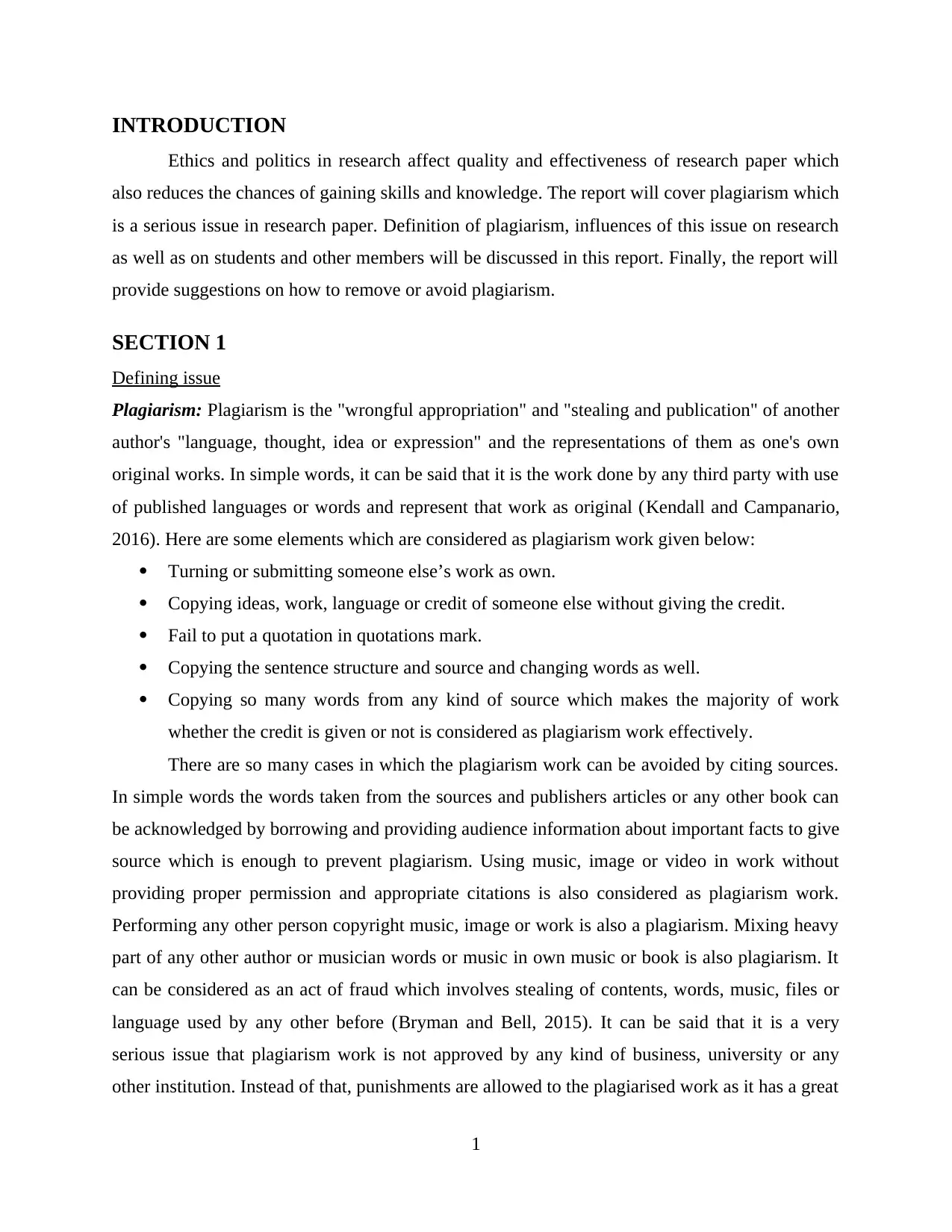
INTRODUCTION
Ethics and politics in research affect quality and effectiveness of research paper which
also reduces the chances of gaining skills and knowledge. The report will cover plagiarism which
is a serious issue in research paper. Definition of plagiarism, influences of this issue on research
as well as on students and other members will be discussed in this report. Finally, the report will
provide suggestions on how to remove or avoid plagiarism.
SECTION 1
Defining issue
Plagiarism: Plagiarism is the "wrongful appropriation" and "stealing and publication" of another
author's "language, thought, idea or expression" and the representations of them as one's own
original works. In simple words, it can be said that it is the work done by any third party with use
of published languages or words and represent that work as original (Kendall and Campanario,
2016). Here are some elements which are considered as plagiarism work given below:
Turning or submitting someone else’s work as own.
Copying ideas, work, language or credit of someone else without giving the credit.
Fail to put a quotation in quotations mark.
Copying the sentence structure and source and changing words as well.
Copying so many words from any kind of source which makes the majority of work
whether the credit is given or not is considered as plagiarism work effectively.
There are so many cases in which the plagiarism work can be avoided by citing sources.
In simple words the words taken from the sources and publishers articles or any other book can
be acknowledged by borrowing and providing audience information about important facts to give
source which is enough to prevent plagiarism. Using music, image or video in work without
providing proper permission and appropriate citations is also considered as plagiarism work.
Performing any other person copyright music, image or work is also a plagiarism. Mixing heavy
part of any other author or musician words or music in own music or book is also plagiarism. It
can be considered as an act of fraud which involves stealing of contents, words, music, files or
language used by any other before (Bryman and Bell, 2015). It can be said that it is a very
serious issue that plagiarism work is not approved by any kind of business, university or any
other institution. Instead of that, punishments are allowed to the plagiarised work as it has a great
1
Ethics and politics in research affect quality and effectiveness of research paper which
also reduces the chances of gaining skills and knowledge. The report will cover plagiarism which
is a serious issue in research paper. Definition of plagiarism, influences of this issue on research
as well as on students and other members will be discussed in this report. Finally, the report will
provide suggestions on how to remove or avoid plagiarism.
SECTION 1
Defining issue
Plagiarism: Plagiarism is the "wrongful appropriation" and "stealing and publication" of another
author's "language, thought, idea or expression" and the representations of them as one's own
original works. In simple words, it can be said that it is the work done by any third party with use
of published languages or words and represent that work as original (Kendall and Campanario,
2016). Here are some elements which are considered as plagiarism work given below:
Turning or submitting someone else’s work as own.
Copying ideas, work, language or credit of someone else without giving the credit.
Fail to put a quotation in quotations mark.
Copying the sentence structure and source and changing words as well.
Copying so many words from any kind of source which makes the majority of work
whether the credit is given or not is considered as plagiarism work effectively.
There are so many cases in which the plagiarism work can be avoided by citing sources.
In simple words the words taken from the sources and publishers articles or any other book can
be acknowledged by borrowing and providing audience information about important facts to give
source which is enough to prevent plagiarism. Using music, image or video in work without
providing proper permission and appropriate citations is also considered as plagiarism work.
Performing any other person copyright music, image or work is also a plagiarism. Mixing heavy
part of any other author or musician words or music in own music or book is also plagiarism. It
can be considered as an act of fraud which involves stealing of contents, words, music, files or
language used by any other before (Bryman and Bell, 2015). It can be said that it is a very
serious issue that plagiarism work is not approved by any kind of business, university or any
other institution. Instead of that, punishments are allowed to the plagiarised work as it has a great
1
⊘ This is a preview!⊘
Do you want full access?
Subscribe today to unlock all pages.

Trusted by 1+ million students worldwide
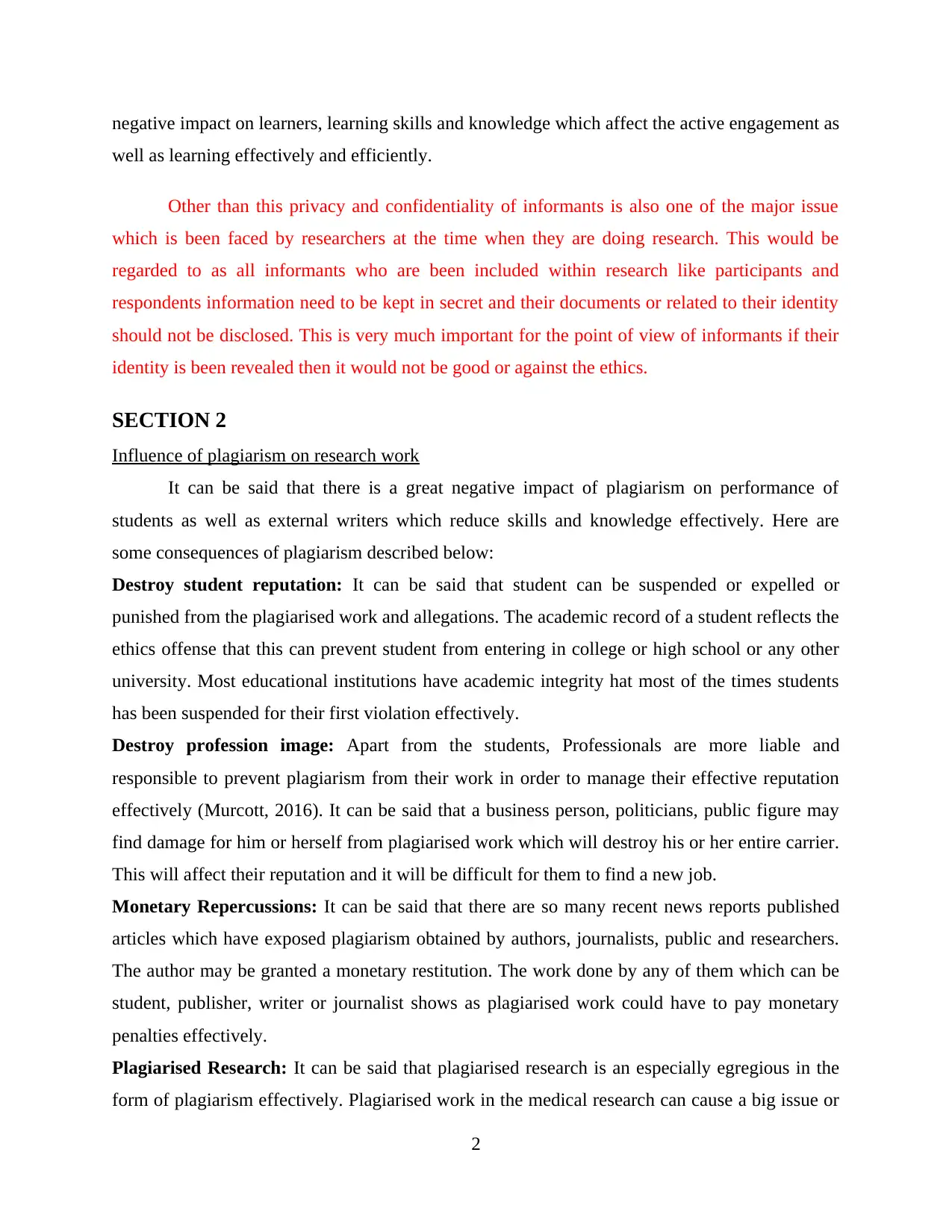
negative impact on learners, learning skills and knowledge which affect the active engagement as
well as learning effectively and efficiently.
Other than this privacy and confidentiality of informants is also one of the major issue
which is been faced by researchers at the time when they are doing research. This would be
regarded to as all informants who are been included within research like participants and
respondents information need to be kept in secret and their documents or related to their identity
should not be disclosed. This is very much important for the point of view of informants if their
identity is been revealed then it would not be good or against the ethics.
SECTION 2
Influence of plagiarism on research work
It can be said that there is a great negative impact of plagiarism on performance of
students as well as external writers which reduce skills and knowledge effectively. Here are
some consequences of plagiarism described below:
Destroy student reputation: It can be said that student can be suspended or expelled or
punished from the plagiarised work and allegations. The academic record of a student reflects the
ethics offense that this can prevent student from entering in college or high school or any other
university. Most educational institutions have academic integrity hat most of the times students
has been suspended for their first violation effectively.
Destroy profession image: Apart from the students, Professionals are more liable and
responsible to prevent plagiarism from their work in order to manage their effective reputation
effectively (Murcott, 2016). It can be said that a business person, politicians, public figure may
find damage for him or herself from plagiarised work which will destroy his or her entire carrier.
This will affect their reputation and it will be difficult for them to find a new job.
Monetary Repercussions: It can be said that there are so many recent news reports published
articles which have exposed plagiarism obtained by authors, journalists, public and researchers.
The author may be granted a monetary restitution. The work done by any of them which can be
student, publisher, writer or journalist shows as plagiarised work could have to pay monetary
penalties effectively.
Plagiarised Research: It can be said that plagiarised research is an especially egregious in the
form of plagiarism effectively. Plagiarised work in the medical research can cause a big issue or
2
well as learning effectively and efficiently.
Other than this privacy and confidentiality of informants is also one of the major issue
which is been faced by researchers at the time when they are doing research. This would be
regarded to as all informants who are been included within research like participants and
respondents information need to be kept in secret and their documents or related to their identity
should not be disclosed. This is very much important for the point of view of informants if their
identity is been revealed then it would not be good or against the ethics.
SECTION 2
Influence of plagiarism on research work
It can be said that there is a great negative impact of plagiarism on performance of
students as well as external writers which reduce skills and knowledge effectively. Here are
some consequences of plagiarism described below:
Destroy student reputation: It can be said that student can be suspended or expelled or
punished from the plagiarised work and allegations. The academic record of a student reflects the
ethics offense that this can prevent student from entering in college or high school or any other
university. Most educational institutions have academic integrity hat most of the times students
has been suspended for their first violation effectively.
Destroy profession image: Apart from the students, Professionals are more liable and
responsible to prevent plagiarism from their work in order to manage their effective reputation
effectively (Murcott, 2016). It can be said that a business person, politicians, public figure may
find damage for him or herself from plagiarised work which will destroy his or her entire carrier.
This will affect their reputation and it will be difficult for them to find a new job.
Monetary Repercussions: It can be said that there are so many recent news reports published
articles which have exposed plagiarism obtained by authors, journalists, public and researchers.
The author may be granted a monetary restitution. The work done by any of them which can be
student, publisher, writer or journalist shows as plagiarised work could have to pay monetary
penalties effectively.
Plagiarised Research: It can be said that plagiarised research is an especially egregious in the
form of plagiarism effectively. Plagiarised work in the medical research can cause a big issue or
2
Paraphrase This Document
Need a fresh take? Get an instant paraphrase of this document with our AI Paraphraser
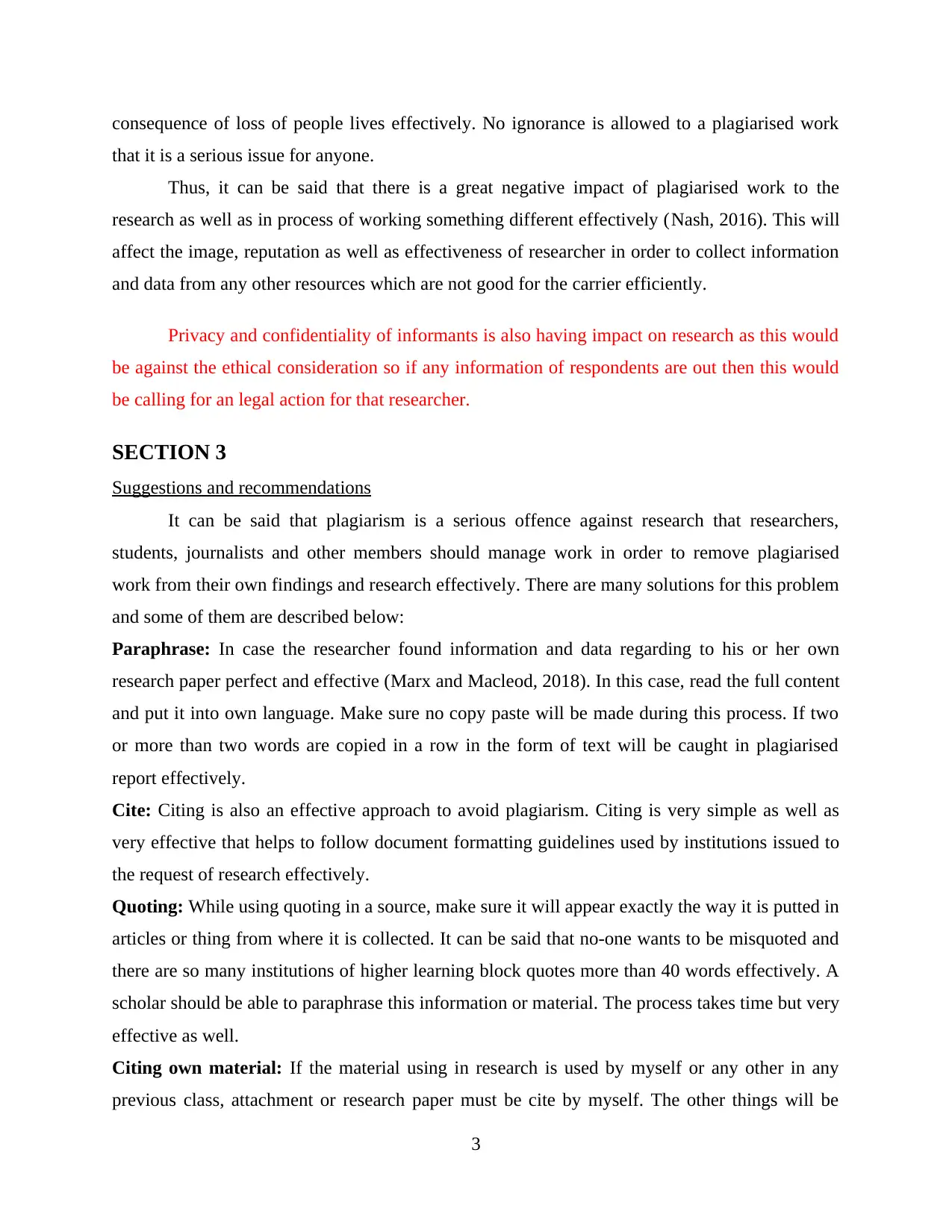
consequence of loss of people lives effectively. No ignorance is allowed to a plagiarised work
that it is a serious issue for anyone.
Thus, it can be said that there is a great negative impact of plagiarised work to the
research as well as in process of working something different effectively (Nash, 2016). This will
affect the image, reputation as well as effectiveness of researcher in order to collect information
and data from any other resources which are not good for the carrier efficiently.
Privacy and confidentiality of informants is also having impact on research as this would
be against the ethical consideration so if any information of respondents are out then this would
be calling for an legal action for that researcher.
SECTION 3
Suggestions and recommendations
It can be said that plagiarism is a serious offence against research that researchers,
students, journalists and other members should manage work in order to remove plagiarised
work from their own findings and research effectively. There are many solutions for this problem
and some of them are described below:
Paraphrase: In case the researcher found information and data regarding to his or her own
research paper perfect and effective (Marx and Macleod, 2018). In this case, read the full content
and put it into own language. Make sure no copy paste will be made during this process. If two
or more than two words are copied in a row in the form of text will be caught in plagiarised
report effectively.
Cite: Citing is also an effective approach to avoid plagiarism. Citing is very simple as well as
very effective that helps to follow document formatting guidelines used by institutions issued to
the request of research effectively.
Quoting: While using quoting in a source, make sure it will appear exactly the way it is putted in
articles or thing from where it is collected. It can be said that no-one wants to be misquoted and
there are so many institutions of higher learning block quotes more than 40 words effectively. A
scholar should be able to paraphrase this information or material. The process takes time but very
effective as well.
Citing own material: If the material using in research is used by myself or any other in any
previous class, attachment or research paper must be cite by myself. The other things will be
3
that it is a serious issue for anyone.
Thus, it can be said that there is a great negative impact of plagiarised work to the
research as well as in process of working something different effectively (Nash, 2016). This will
affect the image, reputation as well as effectiveness of researcher in order to collect information
and data from any other resources which are not good for the carrier efficiently.
Privacy and confidentiality of informants is also having impact on research as this would
be against the ethical consideration so if any information of respondents are out then this would
be calling for an legal action for that researcher.
SECTION 3
Suggestions and recommendations
It can be said that plagiarism is a serious offence against research that researchers,
students, journalists and other members should manage work in order to remove plagiarised
work from their own findings and research effectively. There are many solutions for this problem
and some of them are described below:
Paraphrase: In case the researcher found information and data regarding to his or her own
research paper perfect and effective (Marx and Macleod, 2018). In this case, read the full content
and put it into own language. Make sure no copy paste will be made during this process. If two
or more than two words are copied in a row in the form of text will be caught in plagiarised
report effectively.
Cite: Citing is also an effective approach to avoid plagiarism. Citing is very simple as well as
very effective that helps to follow document formatting guidelines used by institutions issued to
the request of research effectively.
Quoting: While using quoting in a source, make sure it will appear exactly the way it is putted in
articles or thing from where it is collected. It can be said that no-one wants to be misquoted and
there are so many institutions of higher learning block quotes more than 40 words effectively. A
scholar should be able to paraphrase this information or material. The process takes time but very
effective as well.
Citing own material: If the material using in research is used by myself or any other in any
previous class, attachment or research paper must be cite by myself. The other things will be
3
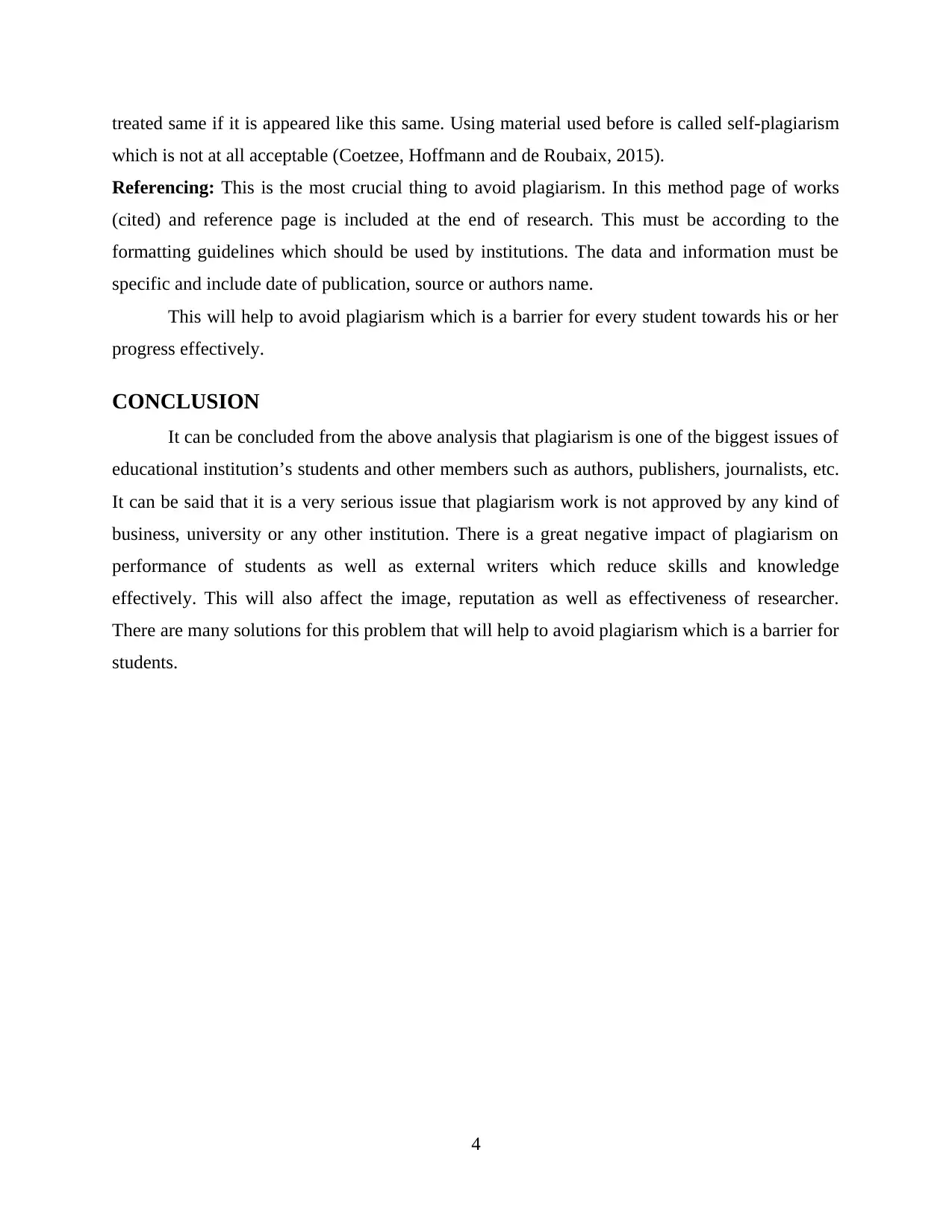
treated same if it is appeared like this same. Using material used before is called self-plagiarism
which is not at all acceptable (Coetzee, Hoffmann and de Roubaix, 2015).
Referencing: This is the most crucial thing to avoid plagiarism. In this method page of works
(cited) and reference page is included at the end of research. This must be according to the
formatting guidelines which should be used by institutions. The data and information must be
specific and include date of publication, source or authors name.
This will help to avoid plagiarism which is a barrier for every student towards his or her
progress effectively.
CONCLUSION
It can be concluded from the above analysis that plagiarism is one of the biggest issues of
educational institution’s students and other members such as authors, publishers, journalists, etc.
It can be said that it is a very serious issue that plagiarism work is not approved by any kind of
business, university or any other institution. There is a great negative impact of plagiarism on
performance of students as well as external writers which reduce skills and knowledge
effectively. This will also affect the image, reputation as well as effectiveness of researcher.
There are many solutions for this problem that will help to avoid plagiarism which is a barrier for
students.
4
which is not at all acceptable (Coetzee, Hoffmann and de Roubaix, 2015).
Referencing: This is the most crucial thing to avoid plagiarism. In this method page of works
(cited) and reference page is included at the end of research. This must be according to the
formatting guidelines which should be used by institutions. The data and information must be
specific and include date of publication, source or authors name.
This will help to avoid plagiarism which is a barrier for every student towards his or her
progress effectively.
CONCLUSION
It can be concluded from the above analysis that plagiarism is one of the biggest issues of
educational institution’s students and other members such as authors, publishers, journalists, etc.
It can be said that it is a very serious issue that plagiarism work is not approved by any kind of
business, university or any other institution. There is a great negative impact of plagiarism on
performance of students as well as external writers which reduce skills and knowledge
effectively. This will also affect the image, reputation as well as effectiveness of researcher.
There are many solutions for this problem that will help to avoid plagiarism which is a barrier for
students.
4
⊘ This is a preview!⊘
Do you want full access?
Subscribe today to unlock all pages.

Trusted by 1+ million students worldwide
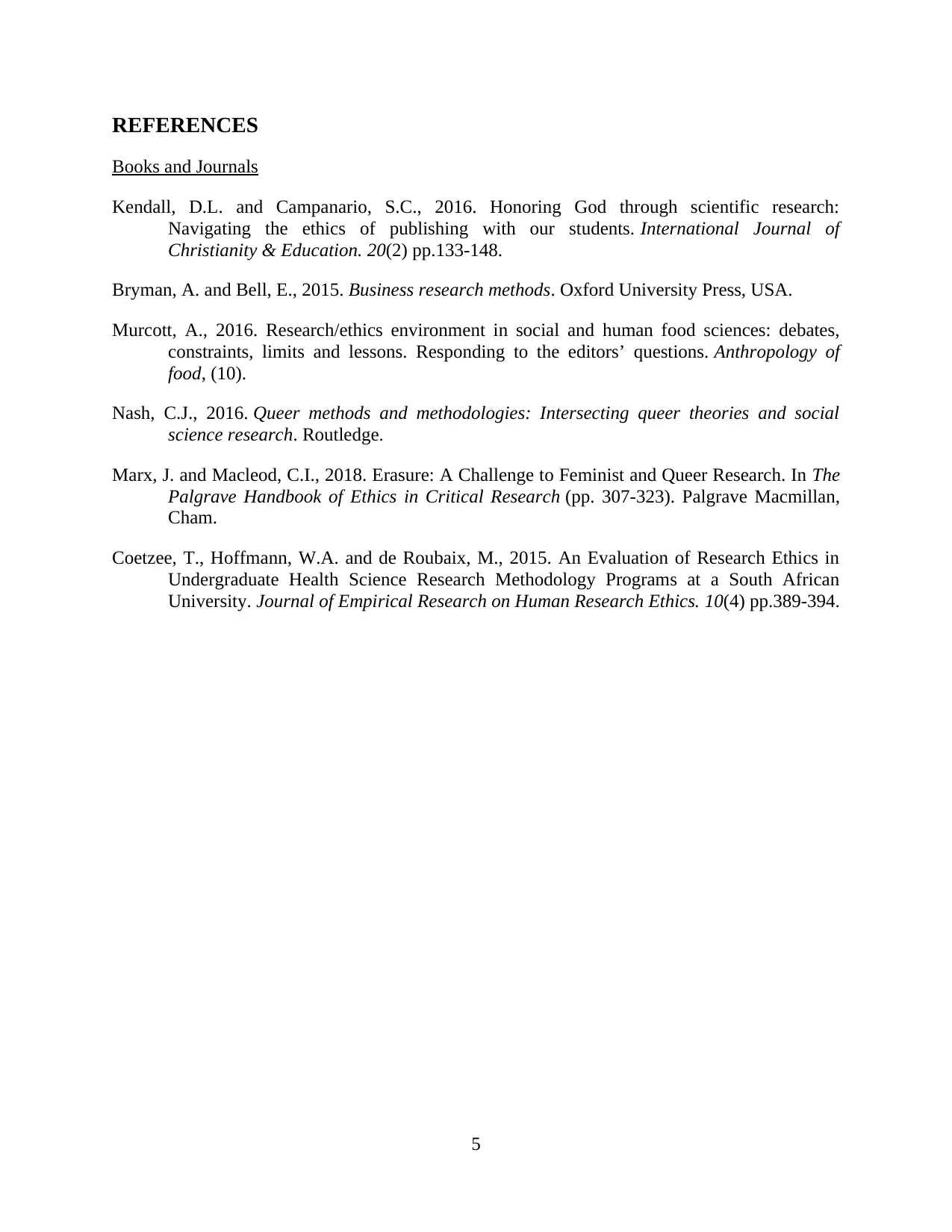
REFERENCES
Books and Journals
Kendall, D.L. and Campanario, S.C., 2016. Honoring God through scientific research:
Navigating the ethics of publishing with our students. International Journal of
Christianity & Education. 20(2) pp.133-148.
Bryman, A. and Bell, E., 2015. Business research methods. Oxford University Press, USA.
Murcott, A., 2016. Research/ethics environment in social and human food sciences: debates,
constraints, limits and lessons. Responding to the editors’ questions. Anthropology of
food, (10).
Nash, C.J., 2016. Queer methods and methodologies: Intersecting queer theories and social
science research. Routledge.
Marx, J. and Macleod, C.I., 2018. Erasure: A Challenge to Feminist and Queer Research. In The
Palgrave Handbook of Ethics in Critical Research (pp. 307-323). Palgrave Macmillan,
Cham.
Coetzee, T., Hoffmann, W.A. and de Roubaix, M., 2015. An Evaluation of Research Ethics in
Undergraduate Health Science Research Methodology Programs at a South African
University. Journal of Empirical Research on Human Research Ethics. 10(4) pp.389-394.
5
Books and Journals
Kendall, D.L. and Campanario, S.C., 2016. Honoring God through scientific research:
Navigating the ethics of publishing with our students. International Journal of
Christianity & Education. 20(2) pp.133-148.
Bryman, A. and Bell, E., 2015. Business research methods. Oxford University Press, USA.
Murcott, A., 2016. Research/ethics environment in social and human food sciences: debates,
constraints, limits and lessons. Responding to the editors’ questions. Anthropology of
food, (10).
Nash, C.J., 2016. Queer methods and methodologies: Intersecting queer theories and social
science research. Routledge.
Marx, J. and Macleod, C.I., 2018. Erasure: A Challenge to Feminist and Queer Research. In The
Palgrave Handbook of Ethics in Critical Research (pp. 307-323). Palgrave Macmillan,
Cham.
Coetzee, T., Hoffmann, W.A. and de Roubaix, M., 2015. An Evaluation of Research Ethics in
Undergraduate Health Science Research Methodology Programs at a South African
University. Journal of Empirical Research on Human Research Ethics. 10(4) pp.389-394.
5
1 out of 7
Related Documents
Your All-in-One AI-Powered Toolkit for Academic Success.
+13062052269
info@desklib.com
Available 24*7 on WhatsApp / Email
![[object Object]](/_next/static/media/star-bottom.7253800d.svg)
Unlock your academic potential
Copyright © 2020–2026 A2Z Services. All Rights Reserved. Developed and managed by ZUCOL.





